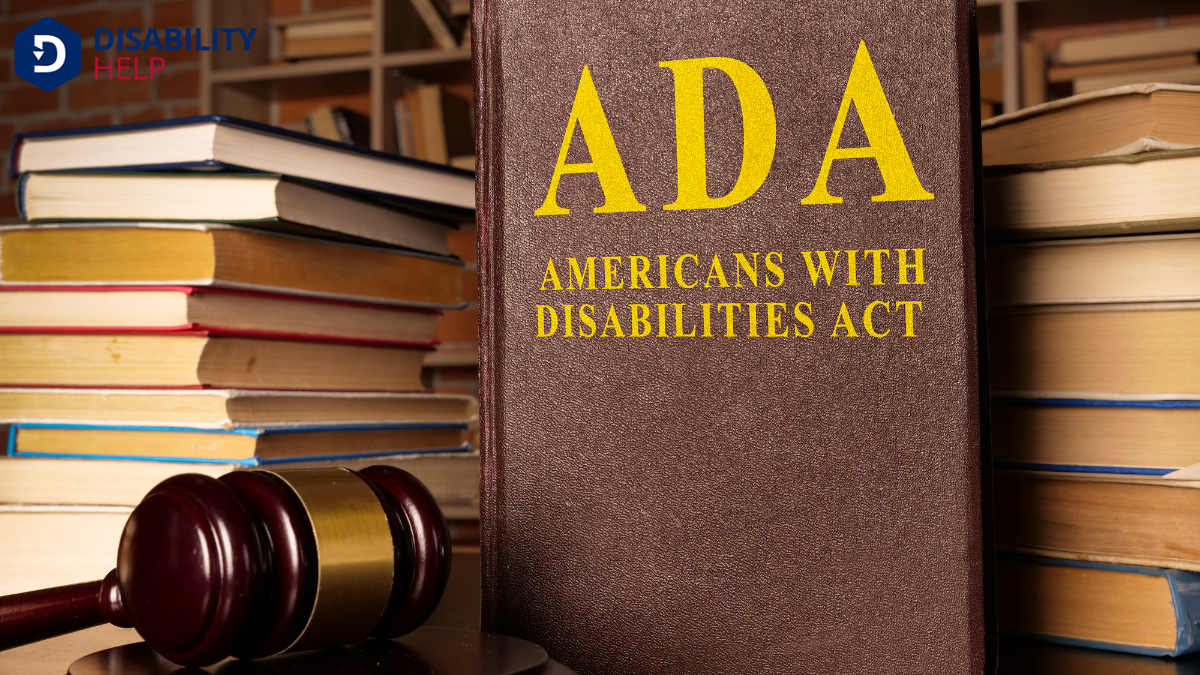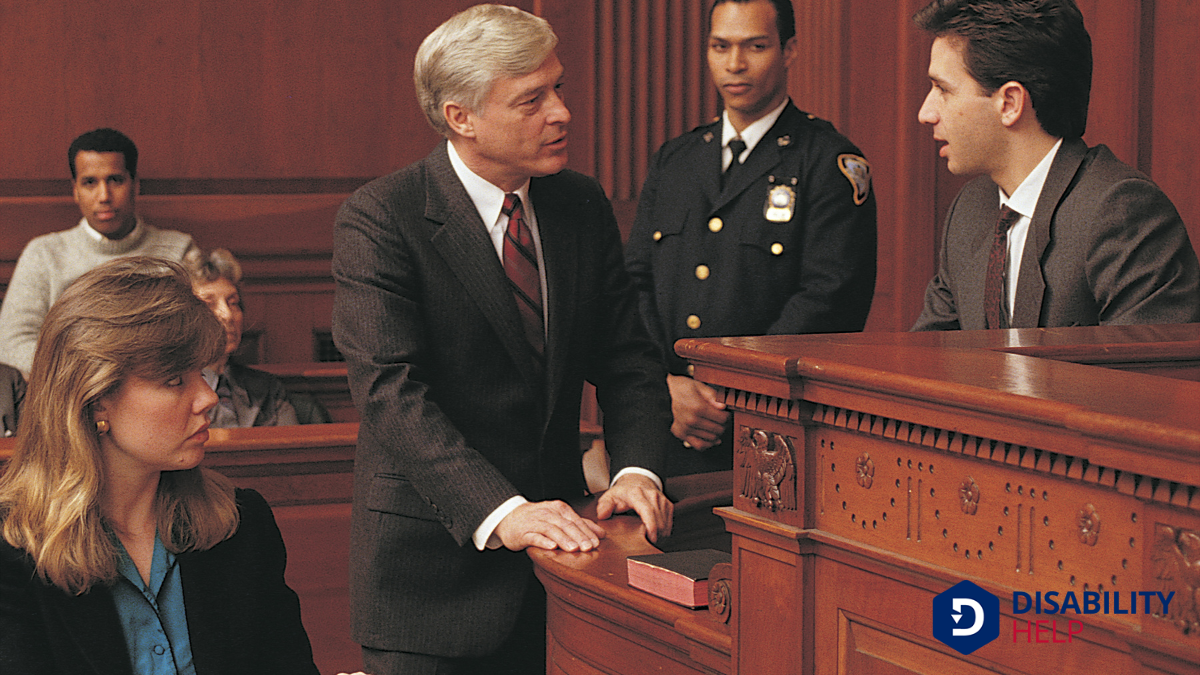We've all seen interpreters in action, but have we considered their essential role as a required accommodationAdjustments or modifications provided to individuals with disabilities to ensure equal access and pa... for deaf individuals? The Americans With Disabilities Act mandates this, ensuring equal accessThe principle that all individuals, including those with disabilities, should have equal opportunity... across various sectors. However, it's not just about compliance—it's about fostering true inclusivity and empowermentThe process of gaining control, authority, and power over one’s life, often used in the context of.... So, how does this legal obligation transform everyday experiences for the deaf community and bridge communication gaps? Let's explore the multifaceted impact of interpreters.
Key Takeaways
- The Americans With Disabilities Act mandates interpreters for effective communication and equal access for deaf individuals.
- Courts are required by ADA to provide qualified interpreters for deaf participation in legal proceedings.
- Businesses must evaluate and offer necessary accommodationsModifications or adjustments in healthcare settings to support patients with disabilities., including interpreters, to meet deaf individuals' communication needs.
- Interpreters facilitate equitable opportunities in education, healthcare, and employment for deaf individuals.
- Interpreters must adhere to professional standards, ensuring accurate and ethical communication without bias.
Understanding the Role of Interpreters
Although we often take communication for granted, understanding the role of interpreters for deaf individuals is essential for fostering inclusivity. Interpreters bridge the gap between deaf and hearing communities, enabling meaningful exchanges. They don’t just translate words—they convey tone, emotion, and context, ensuring the message maintains its intended impact.
We need to recognize that interpreters facilitate access to vital areas such as education, healthcare, and employment. By doing so, they empower deaf individuals to participate fully in society, breaking down barriers that might otherwise hinder their engagement.
It's important for us to appreciate the skills interpreters bring. Their presence isn't simply about language translation; it’s about creating equitable opportunities for communication, fostering a more inclusive environment for everyone involved.
Legal Obligations Under the Americans With Disabilities Act

As we explore the legal obligations under the Americans With Disabilities Act (ADA)A U.S. law that prohibits discrimination against individuals with disabilities in all areas of publi..., we must ascertain that our understanding of ADA compliance requirements is clear.
Effective communication mandates that we provide interpreters when necessary, guaranteeing equal access for deaf individuals.
Let’s also consider how reasonable accommodationModifications or adjustments to a job or environment that enable a person with a disability to perfo... standards guide us in meeting these obligations.
ADA Compliance Requirements
Guaranteeing compliance with the Americans With Disabilities Act (ADA) is essential for providing equal access to services for deaf individuals. We must recognize our legal obligations under the ADA, which mandates that businesses and organizations offer necessary accommodations, such as interpreters, to guarantee effective communication.
This compliance isn't just a legal formality—it's a commitment to inclusivity and respect for all individuals.
Under the ADA, we need to evaluate our facilities and services to determine where accommodations are required. By doing so, we facilitate accessibilityThe design of products, devices, services, or environments to be usable by people with disabilities...., allowing everyone to participate fully and equally.
Understanding our responsibilities helps us create environments that reflect our values of equality and fairness. Let’s guarantee our actions align with the ADA’s intent, fostering accessible and inclusive spaces for everyone.
Effective Communication Mandates
To guarantee effective communication, we must prioritize the needs of deaf individuals by providing the necessary accommodations mandated by the ADA. This legal framework assures that deaf individuals have equal access to informationThe right of individuals with disabilities to obtain and use information, often requiring accessible... and services.
Under the ADA, we’re required to provide appropriate auxiliary aids and services, which may include sign language interpreters or other technologies, tailored to the situation and the individual's needs. It's essential for us to engage in an interactive process with the deaf individual to determine the most effective means of communication.
We must remember, effective communication isn’t just about compliance; it’s about fostering inclusivity and guaranteeing everyone can participate fully in society. Let’s commit to understanding and implementing these mandates effectively.
Reasonable Accommodation Standards
Building on our commitment to effective communication, we must now focus on the reasonable accommodation standards outlined by the ADA.
These standards require us to guarantee that deaf individuals receive equal access to services and opportunities. The ADA mandates that accommodations, such as interpreters, must be provided unless they cause undue hardshipA legal concept that refers to significant difficulty or expense imposed on an employer or service p.... This means we must evaluate each situation to determine if an interpreter is necessary to facilitate effective communication.
We can't assume one-size-fits-all solutions; instead, we must consider the individual's unique needs. Let's remember, it's not just about compliance—it's about creating an inclusive environment.
The Impact of Interpreters in Educational Settings
When we consider the role of interpreters in educational settings, it's clear they've a profound impact on the learning experiences of deaf students.
Interpreters bridge communication gaps, guaranteeing that deaf students can access the same information as their hearing peers. By translating spoken language into sign language, interpreters help students grasp complex subjects, participate in class discussions, and engage with teachers and classmates effectively.
We understand that without this crucial support, deaf students may struggle to keep up with lessons, which could hinder their academic progress.
Interpreters also foster an inclusive environment, promoting equal opportunities for learning. Their presence empowers deaf students, boosting confidence and encouraging active participation.
With interpreters, we guarantee education becomes a more equitable and enriching experience for everyone involved.
Interpreters in Medical and Healthcare Environments
Although we might often overlook the necessity, interpreters play a critical role in medical and healthcare environments for deaf individuals.
When we consider the complexities of healthcare communication, a clear understanding becomes paramount. Interpreters guarantee that deaf patients comprehend medical advice, diagnoses, and treatment options fully. Without them, miscommunication can lead to serious health consequences.
Our healthcare system should prioritize accessibility, and interpreters are integral to this. They bridge the gap between healthcare providers and deaf patients, guaranteeing that informed consentThe legal and ethical requirement to ensure that individuals with disabilities understand and agree ... is genuinely informed. By doing so, they empower individuals to make well-informed health decisions.
We must recognize the importance of providing qualified interpreters in medical settings to enhance care quality and patient safety.
This commitment reflects our respect for equal access to healthcare for all.
Legal Rights and Access to Interpreters in Court

When we consider the rights of deaf individuals in court, it’s essential to understand the legal mandates that guarantee they've access to qualified interpreters.
These mandates not only uphold the right to a fair trial by providing effective communication but also establish standards for interpreter qualifications.
Legal Mandates for Interpreters
Access to interpreters in legal settings isn't just a matter of convenience; it's a fundamental right for deaf individuals. Legal mandates guarantee that this right is upheld, providing equal access to justiceEnsuring that individuals with disabilities have equal access to legal representation, courts, and l....
Let's explore key mandates:
- Americans with Disabilities Act (ADA): This law requires courts to provide necessary interpretive services, allowing deaf individuals to fully participate in legal proceedings.
- Section 504A provision of the Rehabilitation Act of 1973 that prohibits discrimination based on disability in p... of the RehabilitationThe process of helping individuals with disabilities achieve and maintain their optimal physical, se... Act: It prohibits discrimination based on disability, mandating that federal and federally funded courts accommodate the needs of deaf individuals.
- State Laws: Many states have their own laws that complement federal mandates, ensuring thorough access to interpreters.
Ensuring Fair Trial Access
Having established the legal mandates that protect the rights of deaf individuals, let's focus on guaranteeing fair trial access.
We recognize that a fair trial is a cornerstone of justice, and for deaf individuals, this includes access to qualified interpreters. Without them, the ability to follow court proceedings, consult with legal counsel, and participate fully in their defense is severely compromised.
Interpreters bridge communication gaps, guaranteeing that both what's said in court and the deaf individual's responses are accurately conveyed.
This isn't just a legal obligation—it's a moral imperative to guarantee equal access to justice. By prioritizing qualified interpreters in courtrooms, we uphold the integrity of our legal system and protect the rights of all individuals involved.
Let’s work together to guarantee this access.
Interpreter Qualifications Standards
To guarantee that deaf individuals receive the justice they deserve, we must hold interpreter qualifications to the highest standards.
It's essential that interpreters in court settings aren't only skilled but also certified to handle the complexities of legal language effectively.
Let's consider what makes an interpreter truly qualified:
- Certification: Interpreters should have credentials from recognized organizations like the Registry of Interpreters for the Deaf (RID), ensuring they meet rigorous standards.
- Legal Expertise: They must understand legal terminology and procedures to accurately convey courtroom dialogue.
- Cultural Competence: Interpreters should be aware of and sensitive to cultural nuances within the deaf community.
Ethical Considerations in Providing Interpreter Services
When we consider the role of interpreters for deaf individuals, ethical considerations come to the forefront, guaranteeing that services aren't just accessible but also respectful and fair.
We must think about confidentiality, as interpreters handle sensitive information. They should adhere to a strict code of ethics, respecting privacy and maintaining trust.
Additionally, impartiality is vital. Interpreters shouldn't let personal biases influence their work, allowing for transparent communication.
We also need to guarantee that interpreters empower, rather than overshadow, the voices of deaf individuals.
By focusing on these principles, we create an environment where both parties feel valued and heard.
Ethical interpreting isn't just about translating words; it’s about bridging cultures and fostering genuine understanding.
The Importance of Quality and Professional Standards
As we focus on the importance of quality and professional standards, ensuring interpreter competence is essential for effective communication.
We must uphold professional ethics to maintain trust and integrity in our interactions.
Ensuring Interpreter Competence
While discussing the role of interpreters for deaf individuals, it’s vital to emphasize the importance of guaranteeing interpreter competence through quality and professional standards.
We must prioritize competence to provide effective communication, and here's how:
- Certification: Interpreters should hold recognized certifications that demonstrate their skills and knowledge. This assures they meet a minimum quality standard.
- Continuous Education: Like any profession, interpreters need ongoing training to keep up with new techniques and language developments. This secures that they remain proficient and adaptable.
- Experience: Real-world experience is fundamental. Interpreters should have diverse exposure to various settings, from medical to educational, so they're prepared for any scenario.
Upholding Professional Ethics
Integrity and accountability in interpreting are essential for maintaining trust and effective communication. As we consider the role of interpreters for Deaf individuals, upholding professional ethics becomes imperative. We must guarantee that interpreters adhere to established quality and professional standards. This commitment guarantees that all parties involved receive accurate and unbiased translations, fostering an environment of respect and understanding.
We can't overlook the importance of continuous training and adherence to a code of ethics. By doing so, interpreters not only enhance their skills but also reinforce their commitment to serving as reliable communication bridges.
It's essential that we support and demand high standards, guaranteeing that interpreters are both competent and ethical. This approach ultimately benefits everyone, leading to more inclusive and effective interactions.
Cultural Sensitivity and Communication Barriers

When we work as interpreters for deaf individuals, understanding cultural sensitivity is essential to overcoming communication barriers.
We must acknowledge that deaf culture is distinct and rich, with its own traditions and norms. By being culturally aware, we can guarantee respectful and effective communication.
Here’s how we can enhance our sensitivity:
- Educate Ourselves: Let’s learn about deaf culture and its history to appreciate the unique perspectives of deaf individuals.
- Respect Language Preferences: Some may prefer American Sign Language (ASL) while others might use different communication methods. We should respect their choices.
- Stay Open to Feedback: Engaging in open dialogue allows us to adjust our interpretations to better meet the needs of those we serve.
Let’s prioritize empathyThe ability to understand and share the feelings of another, particularly important in understanding... and understanding to build bridges, not barriers.
Deaf Individuals’ Perspectives on Interpreter Services
Understanding how deaf individuals perceive interpreter services is essential for improving our practice. When we engage with the deaf community, we often hear that interpreters play a significant role in bridging communication gaps. However, not all experiences are positive. Some of us have encountered interpreters who lack cultural sensitivity or fail to convey messages accurately.
It's imperative that we listen to these perspectives and recognize the need for qualified and empathetic professionals.
Moreover, the preferences within the deaf community vary. Some individuals feel more comfortable with interpreters who share their cultural background, while others prioritize technical proficiency.
The Future of Interpreter Services in an Inclusive Society
As we look toward the future of interpreter services in an inclusive society, it’s crucial to embrace innovations that enhance accessibility and equality. By doing so, we can guarantee everyone has the opportunity to communicate effectively.
Consider these exciting advancements:
- Technology Integration: New tools, like AI-driven interpretation apps, promise real-time translation, making communication more seamless than ever.
- Remote Interpreting: With the rise of virtual platforms, remote interpreting services are expanding access, especially in areas where in-person interpreters are scarce.
- Cultural Competence: By fostering a deeper understanding of Deaf culture, interpreters can provide more personalized and effective services.
Together, we can harness these developments to build a more inclusive world where communication barriers are minimized and everyone’s voice is heard.
Frequently Asked Questions
How Do Interpreters Differ From Captioning Services?
Interpreters offer real-time, face-to-face communication, translating spoken language into sign language. Captioning provides text translations of audio. Both bridge communication gaps, but interpreters add a personal touch that captioning can’t replicate, enhancing interaction and understanding.
Can Family Members Serve as Interpreters for Deaf Individuals?
We shouldn't rely on family members as interpreters for deaf individuals. They might lack professional training, leading to miscommunication. Let's prioritize hiring certified interpreters who guarantee accuracy and impartiality, fostering a clearer understanding for everyone involved.
What Are the Costs Associated With Hiring Interpreters?
Let's explore interpreter costs together. They vary based on expertise, location, and duration. Typically, fees range from $30 to $125 per hour. It's essential that we consider these factors to guarantee effective communication and accessibility for everyone.
How Can Technology Enhance Interpreter Services for the Deaf?
We can utilize technology by integrating real-time translation apps and video remote interpreting services, enhancing accessibility and reducing communication barriers. These tools empower us to offer more efficient and flexible interpreter services for the deaf community.
Are There Situations Where Interpreters Are Not Necessary?
We might find situations where interpreters aren't needed, like when using technology providing real-time captions. However, let's guarantee accessibility remains a priority, adapting solutions to fit individuals' unique communication needs in various settings.
Conclusion
As we've explored, interpreters play a crucial role in ensuring deaf individuals have equal access to essential services. We're legally obligated under the ADA to provide these accommodations, but more importantly, it's a step toward inclusivity. By embracing professional standards and cultural sensitivity, we bridge communication gaps and empower deaf communities. Let's continue prioritizing quality interpreter services, because together, we can build a more inclusive society where everyone has a voice.






